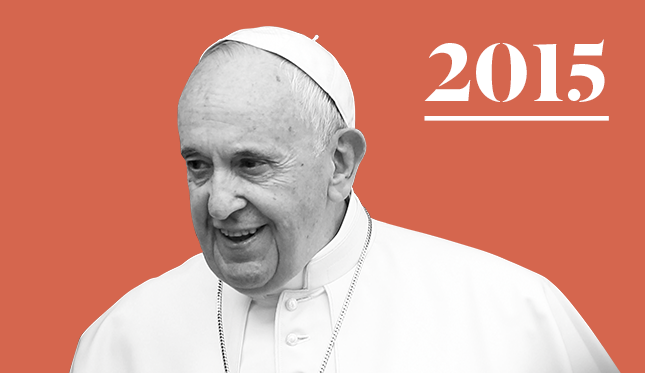The bishop of Rome topped the Power 100 list in 2015. Here, Worth looks back at Pope Francis’ path to power, the power play that landed him in the top spot and where he is now.
What We Said Then
Path to Power: Born Jorge Mario Bergoglio in Buenos Aires to Italian immigrants escaping fascism, Francis worked briefly as a chemical technician, nightclub bouncer and janitor before entering the seminary. In 1969, he was ordained a Catholic priest at age 32. Francis also studied the humanities, earning a graduate degree in philosophy from the Colegio San José in Argentina in 1963 and completing a degree in theology at San José in 1970. In 1973, he became provincial of the Jesuits in Argentina, a key leadership position; in 1992, auxiliary bishop of Buenos Aires; then archbishop in 1998. In 2001, Pope John Paul II named him cardinal. On March 13, 2013, he was elected the 266th pope, the first Jesuit and the first from the Americas to hold that position.
Power Play: Francis has used his new pulpit to launch scathing critiques of capitalism. In a July talk, he argued, “Once greed for money presides over the entire socioeconomic system, it ruins society, it condemns and enslaves men and women, it destroys human fraternity.” Released in May, Laudato Si, his encyclical on the environment, said of the earth, “We have come to see ourselves as her lords and masters, entitled to plunder her at will.” Francis noted that climate change is an economic issue: “Every effort to protect and improve our world entails profound changes in lifestyles, models of production and consumption, and the established structures of power which today govern societies.”
With 1.25 billion Catholics in the world controlling an estimated $150 billion in assets, Francis’ words are having an impact. His encyclical argued for a phase-out of fossil fuels, and now Catholic institutions, from universities to religious orders, are dumping stocks with heavy exposure to coal and other greenhouse gas-emitting energy sources. Investor groups are also urging companies such as Bank of America, Kraft and DuPont to disclose more about their carbon emissions and overall environmental impact. And at the largest 250 U.S. companies, Catholic groups have submitted over a dozen environment-related shareholder proposals. And all of this preceded Francis’ visit to the United States in September, during which he put GOP politicians in the awkward position of either agreeing with the pope on climate change…or disagreeing with the pope on climate change.
Francis’ tenure is young, of course, and impossible to assess in any meaningful way. But the size and devotion of his audience, the force of his language, and his startling blend of modernity and faith have made one of the world’s most powerful religious figures into its most powerful financial figure. And the remarkable thing is, he’s really just getting started.

Where Pope Francis is Now
Francis has continued to speak out on economic issues, most notably with a Vatican document released in May 2018 called Considerations for an Ethical Discernment Regarding Some Aspects of the Present Economic-Financial System. All money-based decisions, from where a family invests to where a company declares its tax residence, can be either virtuous or sinful, it argues. “No profit is in fact legitimate when it falls short of the objective of the integral promotion of the human person, the universal destination of goods and the preferential option for the poor,” says Considerations.







